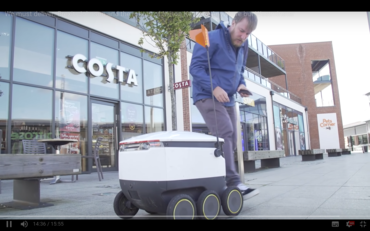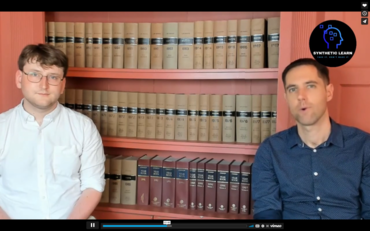Is the juice worth the squeeze?
 Last week, Gikii speakers pondered whether regulating magic could suggest how to regulate AI. This week, Woody Hartzog led a session at We Robot pondering how to regulate robots, and my best analogy was...old cars.
Last week, Gikii speakers pondered whether regulating magic could suggest how to regulate AI. This week, Woody Hartzog led a session at We Robot pondering how to regulate robots, and my best analogy was...old cars.
Bill Smart was explaining that "robot kits" wouldn't become a thing because of the complexity. Even the hassock-sized Starship delivery robot spotted on a Caltrain platform and deliver groceries in Milton Keynes are far too complex for a home build. "Like a car. There are no car kits."
Oh, yes, there are: old cars, made before electronics, that can be taken to pieces and rebuilt; you just need the motor vehicle people to pass it as roadworthy. See also: Cuba.
Smart's main point stands, though: the Starship robots have ten cameras, eight ultrasonic sensors, GPS, and radar, and that's just the hardware (which one could imagine someone plugging together). The software includes neural nets, 3D mapping, and a system for curb climbing, plus facilities to allow remote human operation. And yet, even with all that one drove straight into a canal last year.
"There's a tendency seen in We Robot to think about a robot as a *thing* and to write around that thing," Cindy Grimm observed. Instead, it's important to consider what task you want the robot to accomplish, what it's capable of, what it *can't* do, and what happens when someone decides to use it differently. Starship warns not to disturb its robots if they're sitting doing nothing. "It may just be having a rest."
A rest? To do what? Reorder the diodes all down its left side?
The discussion was part of a larger exercise in creating a law to govern delivery robots and trying to understand tradeoffs. A physical device that interacts with thea real world is, as Smart and Grimm have been saying all the way back to the first We Robot, in 2012, dramatically different from the devices we've sought to regulate so far. We tend, like the Starship people above, to attribute intentionality to things that can move, I believe as a matter of ancestral safety: things that can move autonomously can attack you. Your washing machine is more intelligent than your Roomba, but which one gets treated like a pet?
Really, though, Grimm said, "They're just a box of 1s and 0s."
So Hartzog began with a piece of proposed legislation. Posit: small delivery robots that uses sidewalks, roads, and bike lanes. Hypothetical city council doesn't want to ban outright. But the things can disrupt daily lives and impede humans' use of public space. So, they propose a law: delivery robots must have a permit, Must respect all city ordinances and physical safety of all people. Speed limited to 15 miles an hour. No contact with humans except the designated recipient. Must remain 12 feet apart and prioritize human mobility by moving away from assistive devices and making its presence known via audio signals. Only allowed to collect data for core functions; may not collect data from inside homes without consent; may not use facial recognition, only face detection for safety. What's missing?
Well, for one thing, 15 miles an hour is *dangerous* on a crowded sidewalk, and even in some bike lanes. For another, what capabilities does the robot need to recognize the intended recipient? Facial recognition? Fingerprint scanner? How much do permits cost and who can (and can't) afford them? Is it better to limit robot density rather than set a specific number? How does it recognize assistive devices? How much noise should we tolerate? Who has right of way if there's only one narrow path? If every robot's location must be known at all times, what are the implications of all that tracking? How and when do permits get revoked?
Hartzog left us with a final question: "Is the juice worth the squeeze?" Are there opportunity costs inherent in accepting the robots in the first place?
As Grimm said, nothing is for free; every new robot capability brings tradeoffs. Adding awareness, so the robot "knows" to move out of the way of strollers and wheelchairs, means adding data-gathering sensors, adding privacy risk? Grimm's work with apple-picking robots has taught her their success depends on pruning apple trees to make their task simpler. The job is a lot harder in her backyard, where this hasn't been done. So legal considerations must include how and whether we change the environment so it's safer for robots to be around people. Grimm calls this making a "tunnel" for the robot; narrow and simplify the task rather than making the robot "smarter".
Personally, I like the idea of barring the robots from weighing more than an average human can lift, so you can always pick the thing up and move it out of the way.
No such issues mar the cheery Starship promotional video linked above. This seems impossible; why should delivery robots be less of a nuisance than abandoned dockless scooters and bikes? In the more realistic view to be found in Anywhere But Westminster's 2019 visit to Milton Keynes, the robots still seem mostly inoffensive as they roll through an unpopulated park and wait to cross the empty street. Then the filmmakers encounter one broadcasting Boris Johnson speeches. Suddenly, ad-spewing sidewalk robots seem inescapable. Maybe instead hire the unemployed people the filmmakers find at the food bank?
Illustrations: Screenshot from Anywhere But Westminster, "We must deliver: Brexit, Johnson, and the robots of Milton Keynes".
Wendy M. Grossman is the 2013 winner of the Enigma Award. Her Web site has an extensive archive of her books, articles, and music, and an archive of earlier columns in this series. Stories about the border wars between cyberspace and real life are posted occasionally during the week at the net.wars Pinboard - or follow on Twitter.


-thumb-230x353-1093.jpg)